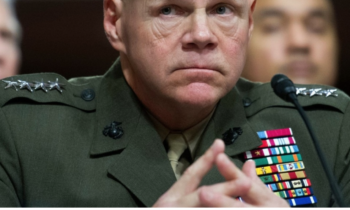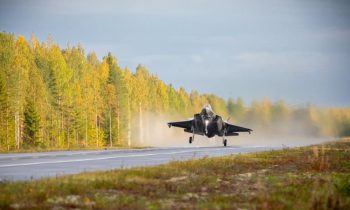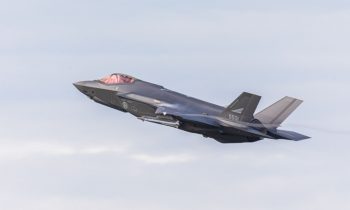 The Marine Corps commandant told about 300 Marines in Norway this week that they should be prepared for a “bigass fight” to come, remarks his spokesman later said were not in reference to any specific adversary but rather intended to inspire the troops.
The Marine Corps commandant told about 300 Marines in Norway this week that they should be prepared for a “bigass fight” to come, remarks his spokesman later said were not in reference to any specific adversary but rather intended to inspire the troops.
“I hope I’m wrong, but there’s a war coming,” Gen. Robert Neller told the Marines on Thursday, according to Military.com. “You’re in a fight here, an informational fight, a political fight, by your presence.”
Neller was visiting a Marine rotational force near Trondheim, about 300 miles north of Oslo. The Marines have been stationed there since January. Their presence in Norway is intended to support operations by NATO and the U.S. European Command, as well as to help the Marine Corps facilitate training in cold weather and mountainous conditions.
But Neller and other Corp leaders told the force they should be prepared for a change in their peacetime mission, should the need arise. In particular, Neller predicted the Pacific and Russia to be the focus of any conflict in the future outside of the Middle East, Military.com reported.
“Just remember why you’re here,” Sgt. Maj. Ronald Green told the troops, according to the military news site. “They’re watching. Just like you watch them, they watch you. We’ve got 300 Marines up here; we could go from 300 to 3,000 overnight. We could raise the bar.”
As the Marines’ top general, Neller is a member of the Joint Chiefs of Staff, the Pentagon’s senior-most leadership team responsible for contingency planning. It was at first unclear to what extent his comments were indicative of an actual war to come or merely meant as a pep talk for troops stationed far from home over the Christmas holiday.
Lt. Col. Eric Dent, a spokesman for the general, told The Washington Post Saturday night that Neller’s remarks “were intended to inspire and focus the Marines’ training.” He added the general had also told the troops none of the four countries he had referenced — Russia, China, Iran and North Korea — wanted to go to war.
“The thought of war has a way of motivating warriors to train hard and increase readiness. I cannot imagine any professional military leader suggesting to his or her Soldiers, Sailors, Airmen, Marines, and Coast Guardsmen that we shouldn’t think that conflict is pending,” Dent said in an email. “Being ready is a constant practice and refocusing. Neller and others have said, ‘If you want peace, train for war.’ That’s exactly what we want and are doing.”
With unusual fanfare, President Trump unveiled a new National Security Strategy last week that cast China and Russia as competitors for global power and potential threats to the United States.
“China and Russia challenge American power, influence, and interests, attempting to erode American security and prosperity,” the document states. “They are determined to make economies less free and less fair, to grow their militaries, and to control information and data to repress their societies and expand their influence.”
As The Post’s Anne Gearan and Steven Mufson reported, however, the new national security strategy dances around Russia’s attempts to meddle in the 2016 presidential election, much in the way Trump has since he was elected:
Trump has publicly complimented Russian President Vladimir Putin, calling him “very smart,” and has sought a better relationship with Russia after years of worsening ties under Obama. He has been openly skeptical of U.S. intelligence findings that Russia mounted a systematic effort to undermine the 2016 presidential election. But Trump has not reversed congressional sanctions on Russia over its actions in Ukraine, as Putin hoped he would.
The strategy document released Monday skirts the issue of Russia’s involvement in the presidential election.
“Through modernized forms of subversive tactics, Russia interferes in the domestic political affairs of countries around the world,” the document says.
(washingtonpost)



